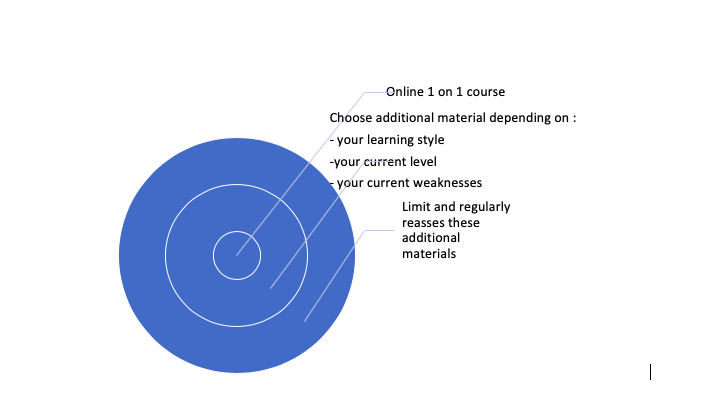In the first article of this series we covered the main reasons to learn a language online. If you do believe it can be something for you or have already embarked on your online learning adventure than this article is for you as it will cover the key tips to successfully learn a language online.
I do however have to point out that by “tips” I mean a set of rules that will help you structure your learning and avoid you drowning in the mass of all the internet has to offer.
This article will be covering three such rules: choose and stick to your choice, stay focused and, finally, join the community.
Now let’s get started!
1. Choose and stick to your choice
The plethora of available choices when it comes to online learning is overwhelming. Every time I wanted to start learning a new language I never quite knew where to start. YouTube? With this eBook I found online as well as it’s matching audiobook or maybe on these apps? Should I get a language partner or first get a hang of the language? What language learning routine should I develop? And the questions went on and on.
I am the type of person that would love to watch – and for hours – these YouTube videos of polyglots explaining how they learned their 15thlanguage online and telling their audience how to achieve just that. Yet I never did I give it a real try.
At some point you have to choose and stick to your choice. This first rule might seem obvious, but it is extremely difficult, and I have to admit that the number of available sources on the internet leave me feeling like a kid in a candy store.
I would personally recommend you to this by working your way from the core to the outskirts of the following circle:

a. Online one-on-one course
Start by picking a one-on-one online course if you’re not using online learning tools to accompany you in a traditional learning environment (i.e. attending a language school physically). This will allow you to benefit from the structure and learning materials provided by a professional teacher. This is especially important when you are a beginner as it will reduce your risks of giving up.
b. When choosing the additional materials…
The beauty of online learning is to give your control of when and what you want to learn. Now I tend to spend hours gathering ideas of eBooks, audiobooks, videos, tutorials and apps to potentially use in order to help me in my studying.
Now there lies the trap. Most of these are free or extremely cheap and you’re making way for what I call the Ikea syndrome– you know, when you go to Ikea just to by this “one thing” and yet keep putting useless ones in your cart because they’re so cheap and pretty and end up spending money for nothing and never actually use them…
The online materials and tools are there to help you not to drawn you. At all times stick to your level– do not wander off listening to Dostoevsky audiobooks in the original if you just started learning Russian. This will help you avoid waking up one day and think that Russian might not be for you. Secondly,try to stick to tools that complement your personal style– do not splurge on audiobooks if you can’t stand still and listen well or money on an app that you end up never using because you like it old school in a textbook and on paper. And thirdly, target your current weaknesses by completing your online one-on-one course with audio if your listening comprehension is not optimal or practice your grammar if you have a good listing and reading comprehension but are unable to write a proper sentence without making many grammatical mistakes.
c. Limit and regularly reassess these additional materials
I would recommend you stick to the rule of “3” – always limit the amount of additional materials to that number (e.g. one app, one audiobook and one eBook). To not diverge and try to stick to these for at least a month. These will be your golden tryptic and once you chose them stop contemplating and wondering if other materials might be suitable as this will only overwhelm you and might tempt you to give up on your current materials thus making you feel like you failed.
Get yourself a calendar or create a specific online calendar just for these – work your way through them on a daily basis and reassess how they worked for you no shorter than one month afterwards.
2. Stay focused
The second golden rule of online learning is to stay focused. In this day of age, we are being bombarded by information on an hourly basis. In order to properly learn a language online you will have to make time just for this. Learning a language requires dedication and consistency. Most people I met that are polyglots are not necessarily more intelligent, but they do manage to focus on solely learning their materials and to follow their targets. Learning a language is a gradual process and it takes place only step by step, there is no quick fix going around it.
Now when you learn a language online you will be using an electronic device that has an internet access, the very devilish friend that gives you access to your various social media platforms, Netflix, gossip websites and so on. In the previous rule we covered how to not get overwhelmed by the extensive amount of online learning materials online. However, this rule will cover how to not get lost on the internet and instead of following the tutorial that you chose as one of your three additional material end up on Instagram.
There are two solutions to this: (a) block these distractions altogether or (b) incorporate them into your daily life and learning routine.
a. Block them altogether
This is a radical decision and I personally chose to incorporate this one. There are many free apps on the market that allow you to block your “guilty pleasure” websites and platforms. I opted for the very dramatic looking “SelfControl” app.
b. Incorporate them to your daily life and routine
We all have an online life. There is – unless you are extremely radical in your way of life – no going around it. As such, I block these distractions when I am actually studying but I do, however, incorporate in the rest of my daily life as part of my “unconscious” online learning. As such I have:
- changed the target language of my phone, Facebook/Instagram/YouTube and computer to Russian,
- started to watch Russian vloggers in my spare time (Instead of my English-speaking favorites),
- and started following Russian celebrities on social media and regularly lose myself in the comments.
3. Join the community
You could be learning a language as purist, for its sheer beauty and in order to grasp its linguistic particularities. Or, like most people, you learn it as a medium to communicate, share and grow in your personal as well as social life.
The third golden rule is here to remind you that you do not have to be fluent to join the community of your target language. Learning a language is not a lonely process. In fact, it is quite the opposite!
I found it to be extremely motivational to grow my network from the first day of me starting to learn my new language. Now you might be thinking: “What the heck does this girl think? That I will just find random Russians in my hometown to spare their precious time and speak to me?”.
You might be right about this one but by network I do mean that you are not the only person on this beautiful planet to be learning this very language. The online realm is full of people just like you and of native speakers ready to help you!
Join the many available online forums such as Busuu, Fluent in 3 Months , Duolingo or Livemocha. All these platforms are dedicated to people learning new languages but remember that it is vital for you to be engaged – even a tad – rather than just passively reading the forums.
Many of will allow you to practice, share and meet like-minded people who could potentially become your language partners and friends.
This brings me to my next point: find online language partners. Your one-on-one online professor is there to teach you grammar and practice your written, oral and speaking skills but language partners are there to remind you why it is that you are learning this language. There have been so many days where I kept asking myself why the hell I decided to learn such a difficult language and a short conversation with a native gave me hope. Many apps and websites can help you in this: italki , Conversation Exchange , InterPals or My Language Exchange . Again, don’t get overwhelmed and just get started and stick to one of these platforms! Remember rule number one!
A last tip before concluding this article would be that when interacting in this online community you have to put a little bit of effort in it: prepare your online conversations beforehand (I usually do a few flashcards with topic names and a few questions – this is of course useful in the beginning as the more you will converse the more it will become like a regular friendship) and help others that are learning the languages that you already speak community is all about sharing.
That’s it! I hope that this article was helpful and do not hesitate to leave any of your questions in the comments bellow. I wish you all a beautiful journey in the realm of online language learning and stay tuned for the next article of this series.


Hi,
I have two sons who were adopted from Ukraine at 4 and 6 years of age. We live in Arizona (USA) where Russian is not taught. I would like my sons to re-learn their original language. They are now 14 and 16. Would this be a good option for them?
Hi Danita! It’s definitely a good option. The key is consistency!